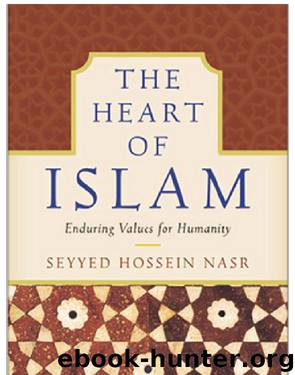The Heart of Islam by Seyyed Hossein Nasr

Author:Seyyed Hossein Nasr
Language: eng
Format: epub
Publisher: HarperCollins
ISLAMIC SOCIETY: THE IDEAL AND THE PRACTICE OF THE GOOD LIFE
It is essential to distinguish between the ideal society described in the Quran and Hadth and historical Islamic society. If the two were identical, there would be no evil or shortcomings in the world, and the world would not be the world with all its imperfections. In fact, throughout their own history, Muslims have looked upon the society of Medina at the time of the Prophet as the ideal society, as the golden age of Islam, religiously speaking, and have sought to emulate that society to the extent possible, but have always fallen short. Generations of young Muslims have been told stories of that period, when, one might say, Heaven and earth touched either other. I remember as a child hearing stories about the Prophet or other great early saints helping the poor, being honest in all affairs, administering justice, and the like from my parents and others. Almost always, numerous contemporary actions in society were contrasted with the ideals set forth by them. Yet tallying up and bemoaning shortcomings is far less profitable than seeking to understand the extent to which Islamic ideals have been implemented and realized in each Islamic society despite the imperfections inherent in the human state, imperfections that the original teachings of Islam itself have taken into consideration. Although every subsequent generation of Muslims has fallen below the standards established by the Prophet in Medina and despite human frailties, each generation until modern times has in fact realized many of the values established by Islam within the society in which it lived.
The ideal norms of society as envisaged by the Quran and Hadth include the establishment of justice and equality before the Divine Law, economic fair play, and the just distribution of wealth, while legitimizing private property and encouraging economic activities, equitable treatment of all human beings (Muslims and non-Muslims living as members of their own respective religious communities within Islamic society), and the creation of a religious social environment in which the presence of the Transcendent is never forgotten. In such a society family bonds are honored over tribal ones, but the truth is considered to be above even family affiliations. It was Christ who said, “Leave all and follow me” and that one should hate one’s parents if they oppose the truth. Likewise, the Quran states, “We have enjoined on human beings kindness to parents, but if they strive to make you join with that of which you have no knowledge, then obey them not” (29:8).
Since the goal of Islamic society is to make possible “Thy will be done on earth,” in the ideal society it is the duty of each Muslim, as stated in several Quranic verses, to “enjoin the good and forbid the wrong” (3:110). This does not mean that individual Muslims should interfere in the affairs of others; rather, each person has the social responsibility to make certain that moral authority reigns in the community. In such a society keeping
Download
This site does not store any files on its server. We only index and link to content provided by other sites. Please contact the content providers to delete copyright contents if any and email us, we'll remove relevant links or contents immediately.
| Africa | Americas |
| Arctic & Antarctica | Asia |
| Australia & Oceania | Europe |
| Middle East | Russia |
| United States | World |
| Ancient Civilizations | Military |
| Historical Study & Educational Resources |
Cecilia; Or, Memoirs of an Heiress — Volume 1 by Fanny Burney(32558)
Cecilia; Or, Memoirs of an Heiress — Volume 2 by Fanny Burney(31956)
Cecilia; Or, Memoirs of an Heiress — Volume 3 by Fanny Burney(31942)
The Secret History by Donna Tartt(19090)
Sapiens: A Brief History of Humankind by Yuval Noah Harari(14389)
Leonardo da Vinci by Walter Isaacson(13336)
The Radium Girls by Kate Moore(12028)
Sapiens by Yuval Noah Harari(5372)
How Democracies Die by Steven Levitsky & Daniel Ziblatt(5219)
The Wind in My Hair by Masih Alinejad(5095)
Homo Deus: A Brief History of Tomorrow by Yuval Noah Harari(4918)
Endurance: Shackleton's Incredible Voyage by Alfred Lansing(4783)
Man's Search for Meaning by Viktor Frankl(4606)
The Silk Roads by Peter Frankopan(4534)
Millionaire: The Philanderer, Gambler, and Duelist Who Invented Modern Finance by Janet Gleeson(4478)
The Rape of Nanking by Iris Chang(4213)
Joan of Arc by Mary Gordon(4112)
The Motorcycle Diaries by Ernesto Che Guevara(4102)
Stalin by Stephen Kotkin(3966)
